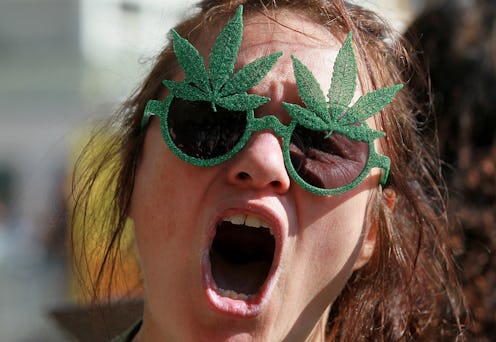News
What is Marijuana Abuse?
As we reported earlier this month, approval of recreational marijuana use has started to climb at gay marriage speed. After decades of having its reputation maligned as a Schedule I drug — that is, the toughest-controlled category reserved for drugs with a high potential of abuse, no medical use, and a lot of associated danger — Americans are finally starting to trust what their own experience tells them rather than an outdated, politically-motivated law. Now, 58 percent of Americans support marijuana legalization — a figure ten points up from the year before. In the early 2000s, Americans opposed legalizing weed by a 30-point margin. Now, legalizing marijuana is more popular than allowing gay marriage.
As a Schedule I drug, marijuana is listed alongside heroin, GHB, and Ecstasy. It’s even in a more restricted ranking than cocaine or crystal meth. But the panic over drug use — any drug use — had stifled conversation about legitimate limits to marijuana use. Even though it’s a fairly harmless drug, are there things that would constitute “abuse”?
Salon’s K.M. Cholewa asked the question of how to regulate marijuana we move towards legalizing it:
[A]s marijuana’s legal status changes, should the framework for what constitutes “abuse” change, too? Is a recreational user of marijuana like the social drinker, using not abusing, indulging a vice but not committing a crime? Advocates of marijuana legalization often, on one hand, point out that the negative social impacts of alcohol are far worse than those of marijuana, which are barely detectable outside of use by minors. Yet, when looking to regulate marijuana use, laws and systems governing alcohol use remain a basic framework for what legalized marijuana laws should look like. The pharmaceutical industry is the other framework.
Cholewa plays through several scenarios — is a pothead who claims (or even actually has) a headache to get medical marijuana on the same ground as someone who skipped the doctor’s note? Is an employee who is performing well but high on the job abusing marijuana? Are artists who use marijuana for creativity really using it recreationally? Here’s what she came up with:
Utilizing the structural dynamics framework, consumption of marijuana might be characterized as “use” if it facilitates one’s progress toward a desired outcome. Conversely, consumption of marijuana might be characterized as “abuse” if it is serving to relieve the tension but is not leading toward a desired outcome. In health-related circumstances determined chronic or terminal, there is no desired outcome beyond symptom relief. However, if one’s assessment of a situation as unchangeable is incorrect (“this boring job is my only option”), the relief gained by using marijuana might, in fact, allow an undesirable situation to be more easily endured, and thus enabled to persist. Perhaps this is “abuse.”
That’s a fine framework. But abuse in most instances — Cholewa herself looked to addictions to come up with this definition — has some obvious negative effect. Alcohol abuse results in long term health damage and is strongly associated with violence, both against oneself and others. Abusing food — using it as an emotional crutch or the like — leads to long-term negative health effects as well, as do a host of other drugs.
But Cholewa’s proposed definition is so broad that one can imagine circumstances under which it would be used to apply to other normally innocuous-seeming conditions. For instance, couldn't you say that some people “abuse” religion in the same way? If, instead of simply using religion to explain the trajectory of the world, an individual uses religion as a crutch to stay in an abusive situation — would that be abuse? Or if an individual uses religion as a reason to undertake a life of celibacy in a monastic order?
Most would probably say that people have enough agency to choose whatever spiritual path they see fit, and to do with it as they please, as long as it didn’t affect others. But it would still fit under "abuse" in Cholewa's definition. If we allow flexibility on some things, why not on pot? Cholewa doesn’t seem to have a problem with “abuse” of marijuana, which is great. But calling it abuse misses the point.
The drug has a higher ratio of fatal dose-to-effective dose than any other comparable substance. While a fatal dose of nutmeg — nutmeg! — is just seven times more than the “effective” does, it would take more than 1000 times the effective dose of marijuana to kill someone. With a ratio that high, it’s practically impossible. (Alcohol, in contrast, has a fatal-to-effective ratio of ten to one.) Plus, as many first-time users are surprised to find out, pot's mind-altering effects are actually quite mild. Those expecting a crazy acid trip are in for a disappointment.
Is there a potential for abuse? I’m sure, just as there is for everything. But other than operating heavy machinery, the use/abuse line will be more blurred for marijuana than most other drugs, and maybe that’s how it ought to be.
